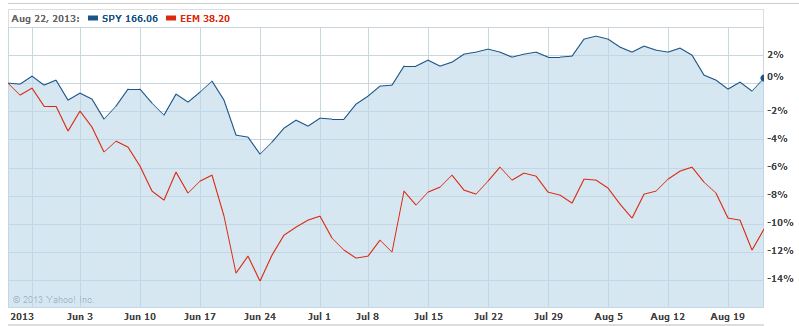Hints from the U.S. Federal Reserve this week that the quantitative easing (QE) taper is near pushed the Dow down 105 points Wednesday - but the idea of less Fed stimulus has caused much more turmoil in certain overseas markets.
The problem: A corresponding hike in U.S. debt yields has fueled higher borrowing costs around the globe. This has led to the flight of cheap capital out of emerging currencies and markets.
That triggered the following reactions:
- The currencies of India and Turkey fell to new all-time lows against the U.S. dollar while bond prices fell.
- Indonesia's currency, the rupiah, also fell to its lowest level since 2009.
- Stocks in Eastern emerging economies like Indonesia, Thailand, and the Philippines plummeted. The Philippine Stock Exchange alone plunged nearly 6% this week.
The Fed's QE taper talk is having a profound impact on account deficits in these nations. With borrowing costs on the rise and new concerns about access to credit, more uncertainty will likely push these markets back to higher periods of volatility not witnessed since before the Fed's latest QE experiments began.
As investors, it may seem like the pitfalls of this global credit squeeze are unavoidable as you look for yield.
But there is a rule to follow that will keep you safe, while able to enjoy the opportunities afforded by some of the strongest foreign markets.
In fact, this rule is the difference between finding real wealth in foreign economies and being the victim of Ben Bernanke's uncharted Fed policies...
How to Navigate Foreign Markets
To understand the foreign market story, you have to look at what's been happening in emerging markets...
Emerging markets, specifically, started showing trouble earlier this year - before "taper talk" was even a trending topic.
Concerns over slowing global growth have weighed on emerging economies' stock markets.
While the S&P 500 has been flat over the last three months (up 0.53%), the iShares MSCI Emerging Markets Index (ETF) (NYSEARCA: EEM) has seen a sharp drop of almost 10%.

Concerns over economic growth, along with lowered demand forecasts, have hammered export-reliant countries, like Thailand.
Thailand's SET and Indonesia's Jakarta Composite Index have fallen 18% and 20% respectively since their May peak. The Philippine stock index is down 17%, whereas India's Sensex is down 10%.
All four of these nations' currencies are down more than 10% in that time.
Editor's Note: Events in emerging markets are about to send one commodity skyrocketing. To learn the best way to play its rise, go here.
But these sharp downturns haven't come as a surprise.
That's because after Japan stabilized its economy in an effort to stave off a recession and European markets appeared to have avoided a similar fate, investor appetite for risk returned with a roar.
Cheap money created by central banking policy fueled false growth in certain pockets around the globe. When central banks in the Group of 10 developed nations slashed bond market returns to zero (and in some cases less), investors went on the hunt for yield.
They found higher returns in riskier bond markets, like Malaysia, Indonesia, and Turkey.
Now the talk of Fed tapering has fueled a sudden rise in U.S. bond yields.
As a result, bond prices elsewhere have been negatively impacted, even in some Eurozone nations.
With high bond prices shifting attention back to the G-10 nations, investors have grown more risk averse in a short period of time.
For emerging economies and currencies, the risk search has become nothing more than a short-term game of musical chairs, and the music is about to stop.
What to Do Now
When the music stops on the Fed's QE policy, there will be a lot of opportunity to get in on the ground floor in a number of global economies. In fact, several areas around the world offer attractive growth possibilities, and nearly each one have the same thing in common.
This brings us back to one rule you need to know about investing in foreign markets...
You see, economic freedom is a significant driver of growth, one that has a strong link to returns and stability for investors.
So the easiest way to invest is to use what Martin Hutchinson calls the "Liberty Investment principle."
This principle emphasizes economic freedom and limitations from corruption to provide peace of mind and confidence in specific markets. It should be no surprise that countries like India, Indonesia, and the Philippines, which offered higher-risk premiums for cheap money investors, are generally "unfree" nations with high concerns about corruption.
And we know this by using two specific tools.
Use the Heritage Foundation Index of Economic Freedom to understand each country's investment opportunity. This index provides a scaled raw score to rank 185 nations on their economic freedoms, including property rights, investing rights, and business rights.
Investors should then evaluate the Transparency International's Corruption Perceptions Index to determine how free of corruption each country has been.
In the East, investors would be better off looking to Hong Kong, Singapore, Australia, and Taiwan if they want to avoid instability and corruption and find peace of mind with their global investments.
In fact, Money Morning's Hutchinson has uncovered four ways to play Australia - and pocket 46% gains. Here's how.
Credit: Money Morning - Only the News You Can Profit From http://feeds.moneymorning.com/~r/moneymorning/jOLe/~3/U0OXLAif7Mo/

